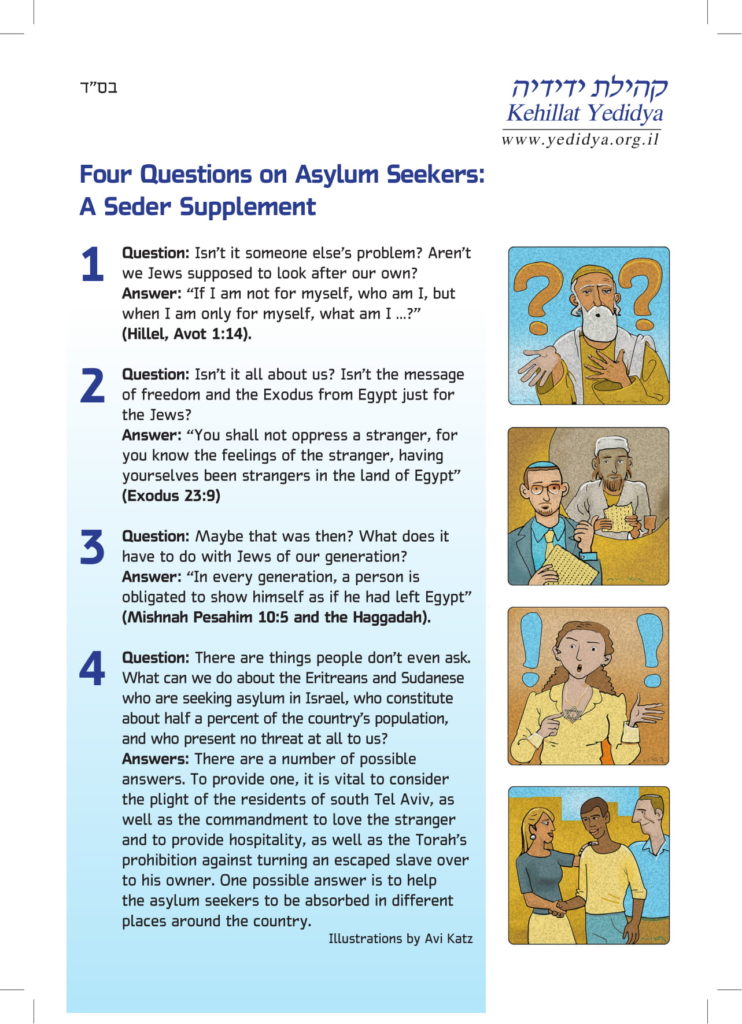Haim Watzman
Ido and I are starting on our second beer on a Monday night at Carousela on Mitudela, just off Gaza, when this old guy comes off the crosswalk, sits down at the table next to us, and begins to cry.
Ido turns and stares. It’s the second weird thing that’s happened since we took our regular spot on the patio to shoot bull and brainstorm our latest project, which is still in the cloudy stage but has, we’re sure of it, incredible potential to turn two part-time art students who met last year on their post-army South American trek into the Next Big Thing.

“Gavriel, he’s crying,” Ido says, too loudly.
Ido’s got talent, but he can be a pain. Says whatever’s on his mind, no filters. I put my hand up in a vertical salute, just by my left eye, to indicate blinders. “What do you think about putting up a strobe light under Ubinas and a mirror under Lake Salinas?” I suggest, referring to our multimedia sculpture, in which we will abstractly portray this newly awakened Peruvian volcano and adjacent salt lake with compostable materials as a metaphor for the bitterness and ecstasy of life and love. We’re not sure whether the volcano represents life and the salt lake love, or the other way around, but that will come, that will come.
Ido doesn’t take the hint. His first beer always gives him a double buzz. So he leans over, puts his arm around the old guy’s shoulder, and asks him what’s wrong. I don’t have time for this.
The guy is old, but how old? Sixty? Seventy? More? He’s got a fringe of white and brown hair surrounding a bald pate and a face that looks weathered and tired. But he straightens his gaunt torso as Lily, the waitress, complaining that she’s been literally run off her feet
Gazing at Iris — “Necessary Stories” from The Jerusalem Report
Haim Watzman
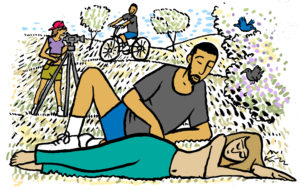
Yehoshua had passed this spot a few days earlier while riding his bike to his student waiter job at Tmol Shilshom. He spotted a pair of lovers on the peak of the hill, the girl lying on her back, sleeping peacefully, and the guy seated, leaning on his left arm, gazing at her face. A few minutes after passing, as he approached the restaurant, he circled back to the park to observe them again. The guy, with his short black beard and loose tee-shirt, could have been him. And the girl, in her loose trousers, with light brown hair splayed over the grass, could have been Iris. The guy was still gazing, the girl still dozing, and it seemed to Yehoshua that there, on that knoll, amid the purple flowers and shining dark birds, love was as pure as it ever could be. The sour face from the shift manager for being a few minutes late didn’t faze him. He would bring Iris to that spot on Shabbat, and they would be in love like that.
“What are you doing?” Iris asks, one eye still closed.
He smiles. “Gazing at you.”
“Well, stop it. It makes me nervous.” She closes her open eye. After a minute she opens it again. “I said stop it.”
“But you’re so amazing,” Yehoshua says, his whole heart in it. “How can I stop looking?”
She smiles, opens her other eye, and pushes herself up on her elbows. “What’s gotten into you?”
He’s not sure what the right answer is. He thinks back to that other guy and girl. He hadn’t heard them speak. It seemed they didn’t need to.
“I’m being romantic.”
Four Waterfalls, One Hidden — “Necessary Stories” from The Jerusalem Report
Haim Watzman

On to the down-home bargain hotel in shabby-to-slummy Tiberias, where we will spend the long second weekend of Pesach. From our window we have a view, not of Lake Kinneret, but of the rubbish-filled yards of abandoned buildings up the street, and the lonely olive trees that dot the mountain slopes between the upper city’s housing-project neighborhoods.
The next morning, Thursday, the eve of the holiday, we continue north, as far north as we can go, to Metula. We take a right at the gate, then turn right again and again to reach the entrance to the Ayun Reserve. A stream of that name wells up a bit further north, in Marjayoun—I saw it three and a half decades ago, when I shuttled through the town time and again as a soldier serving unenthusiastically in Lebanon. When it crosses the Israeli border, it enters a narrow canyon and spills down a steep series of waterfalls, into the Hula Valley. Thirteen years ago the stream dried up, when Hezbollah diverted the source springs in the Lebanese town to irrigate the fields nearby. A few years ago, the Israel Nature and Parks Authority brought the stream back to life by piping in water from the Dan, a mightier stream to the southeast. Dan and Ayun, along with Hatzbani and Banyas, are the four headwaters of the Jordan, fed by melted snow from Mt. Hermon filtered through limestone strata laid down by primordial seas and pushed up by ancient cataclysms.
Seven years ago, on this holiday, our son died. Niot, our third headwater, was like a stream. He bubbled up, burbled, flowed over rapids, made all around him green and alive. Year round, year by year, for twenty years.
Witch’s Broom — “Necessary Stories” from The Jerusalem Report
Haim Watzman
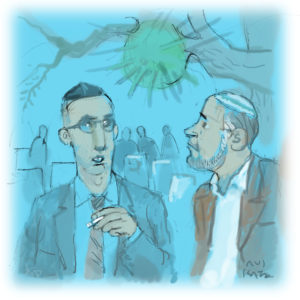
It’s a shame about Ilan. Salt of the earth. A warrior like from the old days. And they sucked his blood, sucked his blood, I tell you, until he didn’t have any left. Did you see Kochava, that’s class, no screaming or wailing like in my family, strong and silent, with the kids standing by her, and grandkids, dignity, I tell you, dignity, that’s what we used to have here in Israel and don’t any more.
Charge! I keep hearing him call out, Forward, charge! And we’d run up the mountain and shooting at those targets as if filling them with holes was going to save the Jewish people. There was something in his voice that made running up a steep slope on a freezing winter morning and plopping yourself on a bunch of thorns the thing you wanted to do more than anything else in the world. And it wasn’t just play. Remember, in Marjayoun, or was it Hasbayiyya, in Lebanon, I don’t even remember anymore, when he saved the entire platoon by spotting the mortar swiveling our way on that bastard Shiite’s roof? And with a single command he got us under cover and firing like maniacs until we took it out. He was a hero, in the pure sense of the word, the greatest hero I ever knew. And they sucked his blood, sucked his blood. Did you see Kochava? She’s at least fifty but she could pass for thirty-five any day, dark and slender, I’d say sexy but it would sound wrong, you’re not allowed to say stuff like that these days. My heart goes out to her. She doesn’t deserve it. The kid’s don’t. Ilan certainly didn’t deserve it, should have been put on a pedestal, given the Israel Prize.
The Third Child — Dvar Torah for Pesach in memory of Niot Watzman z”l
In memory of my younger son, Niot, seven years after his death at the age of 20, during Pesach. From the Pesach 2018 issue of Shabbat Shalom, the weekly Torah portion sheet of the religious peace movement, Oz Veshalom.
להורדת הגליון של “שבת שלום בעברית”
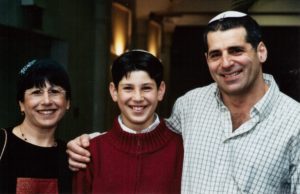 “Take, for example, Beethoven’s Seventh Symphony,” says Lahav Shani, the twenty-nine-year-old conductor who was recently chosen to lead the Israel Philharmonic Orchestra. “It may well be the work that the orchestra has played more times than any other. The musicians can perform it in their sleep. But, precisely when you play something so much, there are things that become routine, and I saw in the music the possibilities of a different balance and a somewhat different point of view” (Ha’aretz, Galeria Shishi, Feb. 16, 2018).
“Take, for example, Beethoven’s Seventh Symphony,” says Lahav Shani, the twenty-nine-year-old conductor who was recently chosen to lead the Israel Philharmonic Orchestra. “It may well be the work that the orchestra has played more times than any other. The musicians can perform it in their sleep. But, precisely when you play something so much, there are things that become routine, and I saw in the music the possibilities of a different balance and a somewhat different point of view” (Ha’aretz, Galeria Shishi, Feb. 16, 2018).
The same can be said for the Pesach Haggadah. Many of us could practically recite it in our sleep. That’s why we need a young “Lahav Shani” on Seder night to freshen up the all-too-familiar material that the traditional Haggadah provides.
Transfigured Night — “Necessary Stories” from The Jerusalem Report
Haim Watzman
Two sit in a café. The cold penetrates the windowpane. Their gaze is not on each other but on the moon, shining through the eucalyptus leaves in a cloudless sky. The woman speaks.
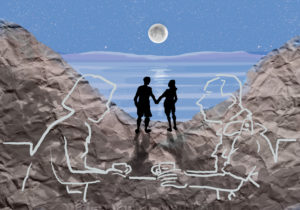
The man wears a uniform, with a colonel’s insignia. Why don’t you stop fondling your gun, she suggests. He had not realized that his left hand had wandered there, and quickly removes it.
He clears his throat. There must be some sort of protocol for this. We can’t be the first. The hand that had been on the gun is now on his head, playing with the clip on his kipah. He brings it down, carefully intertwining its fingers with those of its counterpart, keeping both under control.
The woman shrugs. It’s not up to us. It’s what Eliav wants. And Sivan.
He lets out a long breath, very slowly, focusing on control of his breathing.
Let me put it to you straight, he says. Eliav hates me. The two of us are divorced. Now he’s located his father and invited him. Do you really want me to come?
She sips her cappuccino. The left side of her mouth goes up. He doesn’t know if it’s a smile or an attempt to hold a tear back.
Help Me Rwanda — “Necessary Stories” from The Jerusalem Report
Haim Watzman
Abel surveyed my massive suitcase, carry-on wheelie, and backpack as if he’d never seen luggage before. It had taken a lot of knocking to get him to the door, and I was losing patience.
“You’re going away?” he asked.
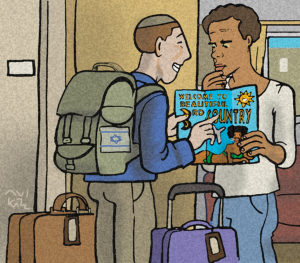
“But Haim,” he said, still confused. “Where are you going? How will I manage without you?”
I pulled the brochure from my pocket and threw it expertly so that it covered the large hole in the upholstery on Abel’s flea-market sofa. “If there’s one value I hold by, it’s justice,” I said. “If I’ve done good, I should get rewarded.”
Abel’s high forehead furrowed as he picked up the brochure and unfolded it.
“Your Future in the Third Country,” he read.
“It arrived for you in the mail. In my mailbox, of course.”
Abel looked confused. “What Third Country?”
“The one our government intends to deport all you Africans to, on the grounds that you are not really refugees. See, according to our government, at the age of twelve you braved death by walking all the way to the Negev from some godforsaken village in the Horn of Africa because you heard you could get a job here washing dishes in a falafel joint.”
Three Codas — “Necessary Stories” from The Jerusalem Report
Haim Watzman
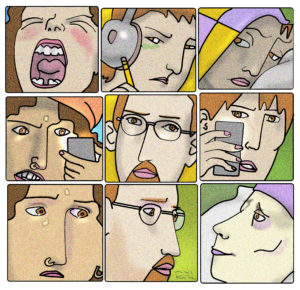
This is how the story ends.
Maya is in her room screaming. It’s long after a second-grader should be sound asleep. Long after I need to be sound asleep. I’m so exhausted that I can’t remember what set off the tantrum, and who cares, the tantrum is almost a nightly event.
She’s so loud that Didi, who is doing homework in the kitchen with something he calls music blaring through headphones into his ears, gives me a helpless look. He’s just started junior high school and is having a hard time.
“I’m sorry that this is the kind of home you have.”
He nudges the right side of the headphone a bit off his ear and shrugs. “It’s not your fault.”
I cast desperately around for an explanation. “Maybe it’s because she needs a father.”
“She’d probably scream anyway, and there’d be three of us suffering.”
I sigh. “I guess it’s not the kind of little sister you dreamed of having.”
“I don’t remember any dreams. One way or the other.”
I head for Maya’s room to try to calm her down.
Honor Thy Mother — “Necessary Stories” from The Jerusalem Report
Haim Watzman
After Kidushin 31a–b
“Baruch! Cheer up! You look like your mother just died!” The shouter of this greeting is Tzefanya, my new locker neighbor at the Jerusalem YMCA Sports Center, which I just joined, after the Jerusalem Pool closed. So I’m actually his new locker neighbor. Actually, we’re both new, because while Tzefania has swum and worked out at the Y for, he claims, at least 50 years, it was at the old facility, which has just been replaced by this spanking new one.
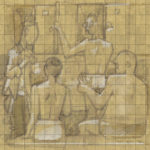 Baruch is probably half Tzefanya’s age, so thin that his tzitziot barely have a shoulder to hang from. Tzefanya is large and hearty and always calls, never speaks. He sounds like the guy who makes the rounds in my neighborhood at 4 a.m. during the month of Elul shouting “Se-li-hot! Se-li-hot!” I’ve never seen that guy’s face, because I never get up that early, even to ask God’s forgiveness, but he probably looks a lot like Tzafanya.
Baruch is probably half Tzefanya’s age, so thin that his tzitziot barely have a shoulder to hang from. Tzefanya is large and hearty and always calls, never speaks. He sounds like the guy who makes the rounds in my neighborhood at 4 a.m. during the month of Elul shouting “Se-li-hot! Se-li-hot!” I’ve never seen that guy’s face, because I never get up that early, even to ask God’s forgiveness, but he probably looks a lot like Tzafanya.
Baruch, Tzefanya, and I are packed onto a bench a meter and a half long, between two banks of closely-placed lockers, along with Nayal, a super-fit software engineer of about Baruch’s age, with close-cropped hair and blue eyes. He’s just putting on his glasses so as to better glare at Tzefanya, which is his usual attitude toward the Tunisian-born grandfather with the muezzin’s voice.
“That’s a really insensitive thing to say to Baruch,” Nayal reprimands him, “given that his mother has, in fact, just died.”
Sweet Unrest — “Necessary Stories” from The Jerusalem Report
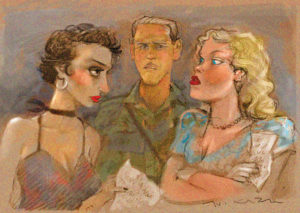
Saturday, July 20, 1946
Dear Adele,
I implore—I demand—you immediately to cease sending me letters and to stop asking after me at Fink’s. It was a fling and it is over. I do not wish to see you again.
Capt. Hugh Fitzsimmons
PS—Bright Star, I am sure that a girl of your qualities will quickly find a love worthy of her. With affection.
Saturday, July 20, 1946
Dear Vicky,
I can understand our Saviour’s reluctance to come to Jerusalem. The heat is oppressive and one can barely breathe, especially here in this inner room at the King David Hotel that no breeze can find. The Galilee’s air is much fresher and cooler. Would you believe that I would welcome a dismal London drizzle? Could you be a dear and send some? Anything to bring relief.
But what do I care if my body is liquefying into pure perspiration? I have come here to be near my Hugh, and to keep an eye on him, for I know very well that he is no more likely to keep his hands and other parts of his body to himself than are the other uniformed men and officers here at headquarters. Vicky, if each British woman who has been fondled, propositioned, and asked to bed by a member of His Majesty’s Armed Forces were to sign her name, we could roll out a petition from my room in Talbiyeh to your place in Bloomsbury.
Coming attractions
Gershom Gorenberg I will be back at the Columbia Graduate School of Journalism in Spring 2018, to teach my writing workshop, The Journalist as Historian. More info on the course will be coming soon. While there – from mid-January to mid-May – I’ll also be available for speaking engagements. Contact me at gershomg@gmail.com if you’d … Read more
